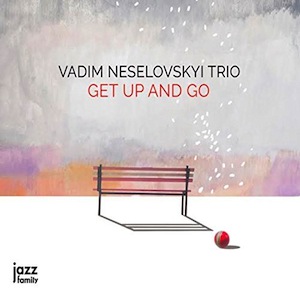Label/Year: Mama Records, 2017
Lineup includes - Hyeseon Hong: composition, direction; Ingrid Jensen: trumpet; Rich Perry: tenor sax; Ben Kono: alto and soprano sax, flute; Matt Vashlishan: alto sax, EWI, flute; Jeremy Powell: tenor sax, clarinet; Andrew Hadro: baritone sax; Ron Wilkens: trombone; Matt Panayides: guitar; Broc Hempel: piano; John Lenis: bass; Mark Ferber: drums.
The name Hyeseon Hong might not be very familiar to the jazz diaspora yet. However, this Korean jazz arranger and composer based in New York shows strong attributes in her debut album, Ee-Ya-Gi (meaning Stories), to get further and enchant the world with her genre-bending orchestrations. Moreover, she surrounds herself with a fantastic group of 18 musicians that make sure her musical stories are emboldened and get proper wings.
The band's lineup not only includes two habitués of Maria Schneider Orchestra, Ingrid Jensen on trumpet and Rich Perry on tenor saxophone, but also the multi-reedists Matt Vashlishan, member of the Dave Liebman’s Expansion quintet, and Ben Kono, who has been working regularly with Ed Palermo, as well as the sought-after drummer Mark Ferber whose percussive thuds and thumps can be found on records by trumpeter Ralph Alessi, his trombonist twin brother Alan Ferber, and Spanish bassist Alexis Cuadrado.
“Harvest Dance” opens the record with a full-bodied richness. Overflowing with contemporary moves, the sounds are elegantly layered within a harmonious combination of Korean melodic grace and Ellingtonian jazz fantasy. The improvisers in this piece are trombonist Dave Wilkens, whose vocabulary develops passionately after a wonderful solo entrance, and Jensen, who drills into the surface, using forceful attacks suffused with melody.
“Friends or Lovers” kicks in with robust power chords, with the similar tones of Pete Townshend and The Who, and advances with contrapuntal horn ostinatos over a bass pedal until acquiring a captivating swinging jazz flow. The first soloist jumping to the forefront is Kono, whose phrasing is delineated with straightforward melodies that take a convincing rhythmic course. The articulated guitarist Matt Panayides, who skillfully plays with pitches and intervals, immediately follows him and just before the rock curtains come down again to finish off the tune, Vashlishan brings his EWI to the spotlight.
This vibrant setting is softened on “Para Mi Amigo Distante”, a gentle yet colorful piece freshly dressed up with bossa nova outfits. The mellifluous melodic guidelines are reinforced through Kono’s soprano, whose easiness made me think of Toots Thielemans, but the tenor player Jeremy Powell fires it up a little bit.
Carrying a traditional Korean folk melody at its core, “Boat Song” moves at an arresting 6/4 tempo, featuring emotional vocalized laments and a beautiful, heartfelt solo full of intention by the veteran tenorist Rich Perry. This Oriental balminess diverges from the classical aromas of Broc Hempel’s piano on “Disappearing Into Foam”, a palpitating waltz inspired by Hans Christian Andersen’s The Little Mermaid.
The cartoonish melodies and strong rhythmic accentuations of “Trash Digging Queen” contrast with the delicacy of “Love Song”, the closing tune. Both feature Jensen’s wide-ranging dynamic lines.
Exhibiting an insatiable appetite for jazz-fusion, Ms. Hong proves to be a talented orchestrator and musical thinker who is not afraid to risk while crossing genre boundaries.
Grade A-
Favorite Tracks:
01 – Harvest Dance ► 02 – Friends Or Lovers ► 04 – Boat Song








































